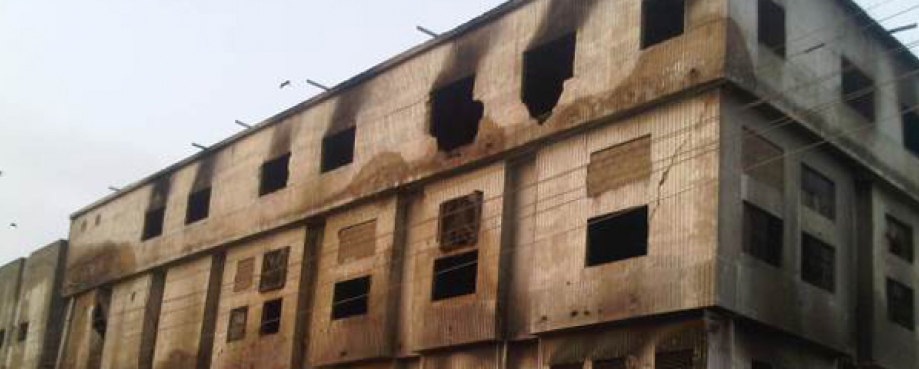
While progress has been made after two horrific factory disasters in Bangladesh, everybody seems to have forgotten about Pakistan’s worst-ever industrial disaster.
When I started doing training about ethics in garment production, I used to ask people to take off their clothes. Let me clarify - nothing untoward happened. I asked maybe the men in the audience to take off a jacket, or a tie, and we would look at the label to see where it was made.
The ETI training courses don’t ask you to do anything like that now, although I often ask people to check out the sheets and towels they have at home – there is a good chance they were made in Pakistan (or Egypt, but that is another story). And that should make you think.
Because today, 11 September, we should remember what happened exactly a year ago at the Ali Enterprises factory in Baldia Town suburb of Karachi. Shehzad Ali, who was working on the second floor, described what happened.,
"The electricity went off with a sound of a blast, followed by four to five more explosions that filled the entire floor with poisonous gas. There was total chaos as people ran for safety but found no way to escape because the main entrance and the gate on the second floor were closed."
Passageways were blocked with piles of clothing. Dozens of workers escaped death by jumping from windows, breaking limbs in the process. Out of the 200 working on the third floor, only one worker survived, suffering major burns. The precise number of workers on site is unknown, as most were employed through contractors. More than 250 workers died.
Just like Rana Plaza in Dhaka a few months later, the building violated controls. Only one storey was approved with a maximum of 250 workers. Ali Enterprises had illegally built two extra floors and hired 1,500 workers. Inside, the workspace was severely overcrowded with machines and work in progress.
The fire was almost certainly triggered by a short circuit, setting off fires and explosions in combustible material kept in the same room as the transformer.
But there is a lot we don’t know about what happened. The well respected Pakistan Institute of Labour Education & Research (PILER) carried out an independent investigation – but the Government commissioned report, although completed months ago, has not been published. Trade unions believe that government is protecting the factory owners.
That would be nothing new. Most labour laws in Pakistan date from the British period - my personal favourite is the Mines Act of 1923, which will have been based on the UK Act of 1911. TIP: don’t go down a mine in Pakistan. The Factories Act dates from 1934. In fact the only labour law the Government of Pakistan spent any effort in updating after the British left was the law on trade unions - making it much harder, of course, to organise workers.
The Ali fire took place in the evening of 11 September. On the morning of the same day, around 40 workers were killed in a fire in an illegal shoe factory in Lahore.
97% of all factories in Pakistan are illegal - not registered with any government agency. We don’t even know the name of the shoe factory. When you have finished checking your towels, check your shoes, please.
However, the real shocker is that the factory had been awarded SA8000 Certification just one month earlier - which should only have been given if the factory reached a high standard of social compliance. Quite how this happened has not yet been explained.
Soon after the Karachi inferno, the Tazreen factory fire, and then the Rana Plaza collapse, brought the spotlight onto Bangladesh. There has been excellent work by trade unions, companies and others there leading to the Accord on Fire & Building Safety, which many UK retailers have now joined - and there are several other initiatives. It’s too early to say whether all this will make a difference to Bangladeshi garment workers; but there is chance.
Meanwhile, everybody seems to have forgotten about Pakistan’s worst-ever industrial disaster. The new government has said nothing. Global buyers seem to be keeping quiet.
Today, at least, spare a thought for the workers of Ali Enterprises.
